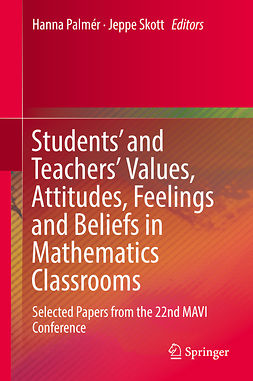Andrà, Chiara
Teaching and Learning in Maths Classrooms
1. Introduction
Esther Levenson
Part I. Classroom Practices: Explanation, Problem-Solving, Patterning, Decision-Making, Drawings and Games
2. Prospective Primary Teachers’ Beliefs Regarding the Roles of Explanations in the Classroom
Esther Levenson, Ruthi Barkai
3. Defining, Drawing, and Continuing Repeating Patterns: Preschool Teachers’ Self-efficacy and Knowledge
Dina Tirosh, Pessia Tsamir, Esther Levenson, Ruthi Barkai, Michal Tabach
4. Primary School Students’ Images of Problem Solving in Mathematics
Hanna Palmér, Lena Karlsson
5. Secondary School Mathematics Teachers’ Conceptions on Data-Based Decision-Making: Insights from Four Japanese Cases
Orlando González
6. Teachers’ Activities During a Mathematics Lesson as Seen in Third Graders’ Drawings
Maija Ahtee, Liisa Näveri, Erkki Pehkonen
7. Serious Frivolity: Exploring Play in UK Secondary Mathematics Classrooms
Elizabeth Lake
Part II. Teachers’ Beliefs, Changing Beliefs and the Role oftheEnvironment
8. In-Service Math Teachers’ Autobiographical Narratives: The Role of Metaphors
Chiara Andrà
9. A Contribution to the Relation Between Teachers’ Professed and Enacted Beliefs
Andreas Eichler, Katinka Bräunling, Hanna Männer
10. Raising Attainment: What Might We Learn from Teachers’ Beliefs About Their Best and Worst Mathematics Students?
Kim Beswick
11. Numeracy Task Design: A Case of Changing Mathematics Teaching Practice
Peter Liljedahl
12. Math Lessons: From Flipped to Amalgamated, from Teacher- to Learner-Centered
Domenico Brunetto, Igor Kontorovich
13. Emotional Expressions as a Window to Processes of Change in a Mathematics Classroom’s Culture
Einat Heyd-Metzuyanim
14. Mathematics Teachers’ Conceptions of the Classroom Environment
Magnus Fahlström
Part III. Understanding the Undercurrents: Tensions, Inconsistencies and the Social Turn
15. Teacher Tensions: The Case of Naomi
Annette Rouleau, Peter Liljedahl
16. Towards Inconsistencies of Parents’ Beliefs About Teaching and Learning Mathematics
Natascha Albersmann, Marc Bosse
17. Evoking the Feeling of Uncertainty for Enhancing Conceptual Knowledge
Igor’ Kontorovich, Rina Zazkis
18. Criteria for Identifying Students as Exceptional in a Mathematical Camp for “Gifted” Students
Rachel Hess-Green, Einat Heyd-Metzuyanim
19. Identity and Rationality in Classroom Discussion: Developing and Testing an Analytical Toolkit
Laura Branchetti, Francesca Morselli
20. Developing an Analyzing Tool for Dynamic Mathematics-Related Student Interaction Regarding Affect, Cognition and Participation
Laura Tuohilampi
Part IV. Emerging Themes in Affect-Related Research: Engagement, Fear, Perfectionism... and Assessment
21. Motivating Desires for Classroom Engagement in the Learning of Mathematics
Gerald A. Goldin
22. What Are Students Afraid of When They Say They Are Afraid of Mathematics?
Barbara Pieronkiewicz
23. What Is Perfectionism in Mathematical Task Solving?
Lovisa Sumpter
24. Gender Differences Concerning Pupils’ Beliefs on Teaching Methods and Mathematical Worldviews at Lower Secondary Schools
Boris Girnat
25. “Every Time I Fell Down (Made a Mistake), I Could Get Up (Correct)”: Affective Factors in Formative Assessment Practices with Classroom Connected Technologies
Annalisa Cusi, Francesca Morselli, Cristina Sabena
26. Teachers’ Affect Towards the External Standardised Assessment of Students’ Mathematical Competencies
Giulia Signorini
27. Conclusion
Peter Liljedahl
Nyckelord: Education, Mathematics Education, Teaching and Teacher Education, Cognitive Psychology, Personality and Social Psychology, Knowledge - Discourse, Educational Technology
- Utgivare
- Andrà, Chiara
- Brunetto, Domenico
- Levenson, Esther
- Liljedahl, Peter
- Utgivare
- Springer
- Utgivningsår
- 2017
- Språk
- en
- Utgåva
- 1
- Serie
- Research in Mathematics Education
- Sidantal
- 23 sidor
- Kategori
- Fostran, undervisning
- Format
- E-bok
- eISBN (PDF)
- 9783319492322
- Tryckt ISBN
- 978-3-319-49231-5











